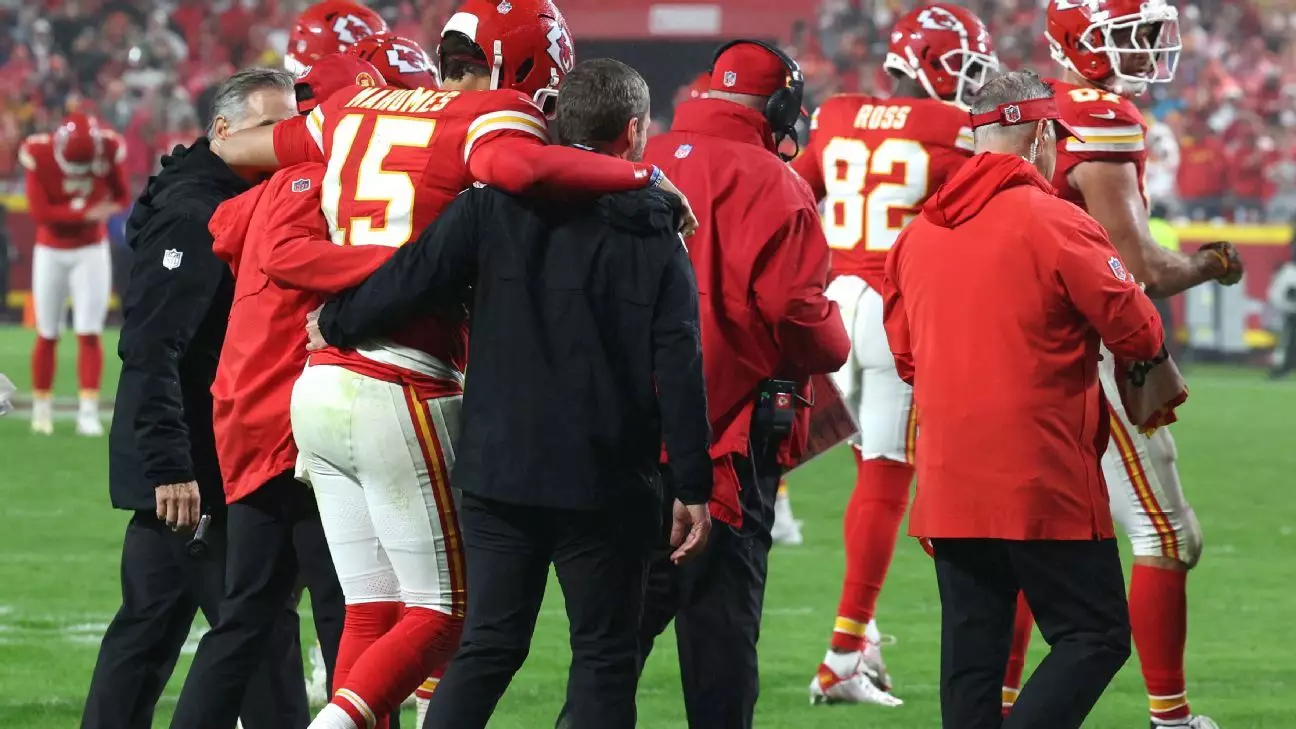The game between the Kansas City Chiefs and the Tampa Bay Buccaneers showcased not just the athletic brilliance of quarterback Patrick Mahomes, but also the resilient spirit that defines competitive sports. Mahomes’ performance contained a dramatic turning point when he sustained an injury to his left ankle during the intense moments of the fourth quarter. The narrative that unfolded not only garners admiration for Mahomes’ skill but highlights the pressure and vulnerability that athletes often face.
As Mahomes found himself in a position that seemed routine—a throw intended for his teammate—everything changed in an instant. The injury occurred during a non-contact play, which adds another layer of concern given how unpredictable such situations can be. For an athlete, especially one with previous injuries, the pain elicited immediate fears of severity. “Definitely scary,” Mahomes articulated, emphasizing the emotional turmoil athletes endure, as that sharp pain radiated through his body. The mental aspect of injury—the uncertainty it brings—can be just as daunting as physical pain. His mention of the previous ankle sprain only compounded his fears, illustrating how the psychological scars of past injuries can linger long after the physical ones have healed.
Kansas City Chiefs’ head coach Andy Reid emerged as a pivotal figure during this crisis. His instinct to bench Mahomes echoed a common dilemma coaches navigate—balancing the player’s desire to compete with the critical need for their health. Reid’s decision to prepare backup quarterback Carson Wentz was both a pragmatic safety measure and a testament to the seriousness of Mahomes’ condition. “I thought he was joking,” Mahomes chuckled in retrospect, reflecting the competitive spirit that drives player mentality. Athletes often struggle with the notion of stepping back, often pushing through discomfort to contribute to their team’s successes.
The interplay of communication between Mahomes and Reid is critical, showcasing the relationship built on mutual respect and understanding. While Mahomes’ instincts as a competitor urged him to remain in play, Reid highlighted Mahomes’ character, admitting that the young QB might have been ready to fight for his position on the field. This dynamic encapsulates the essence of sportsmanship—where passion meets pragmatism.
As the game progressed, Mahomes demonstrated resilience that extends beyond his physical capabilities. Through pain management and a series of mobility tests executed on the sideline, he gained the confidence to resume play. “You feel the pain, and that scares you,” he said, voicing a sentiment that resonates with anyone who has experienced a physical setback. Yet, Mahomes embodies an important lesson in resilience; it’s not about the absence of fear or pain, but rather the ability to persist despite it.
Despite the daunting circumstances, Mahomes not only stayed in the game but contributed to a thrilling 30-24 overtime victory, reinforcing the adage that great moments often emerge from adversity. The touchdown pass to running back Samaje Perine showcased his talent, but it was his refusal to allow fear of injury to dominate the moment that exemplified the true spirit of the game.
Mahomes’s immediate plans include participating in the upcoming home game against the Denver Broncos, which speaks not only to his physical readiness but to his unwavering commitment to the team. “I just kind of got back to it and got back moving again,” he said, underscoring his quick adaptation to trying circumstances. As athletes often do, Mahomes is prepared to face whatever challenges lie ahead, showcasing a mindset steeped in experience and an understanding of what it requires to perform at the highest level.
Patrick Mahomes’ experience during this intense game offers insights into the competing narratives of vulnerability and tenacity. It’s a reminder that behind the athletic prowess, every player faces the mental and physical challenges that accompany their passion. Mahomes’ determination makes him not just a remarkable player, but a representation of the resilience and heart that defines sports. As fans look forward to his continued journey, the essence of his experience remains a profound testament to human spirit and competitive nature.


Leave a Reply